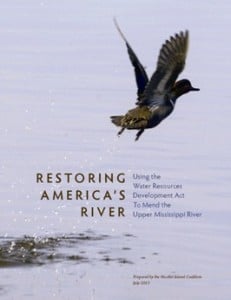Using the Water Resources Development Act To Mend the Upper Mississippi River
 When they return from summer recess, Congress will consider a new Water Resources Development Act to guide the Army Corps of Engineers’ management of the US Inland Waterways System and authorize funds for specific waterways programs and projects. In the past, the Act has served mostly as a list of earmarks. With Congress’s recent ban on earmarks, there is some uncertainty about what the renewal of this periodically-revised law will look like. We see this as a great opportunity to fix several fundamental problems with how the Mississippi River is managed. In fixing those problems, we can go a long way towards dealing with longstanding River health issues like:
When they return from summer recess, Congress will consider a new Water Resources Development Act to guide the Army Corps of Engineers’ management of the US Inland Waterways System and authorize funds for specific waterways programs and projects. In the past, the Act has served mostly as a list of earmarks. With Congress’s recent ban on earmarks, there is some uncertainty about what the renewal of this periodically-revised law will look like. We see this as a great opportunity to fix several fundamental problems with how the Mississippi River is managed. In fixing those problems, we can go a long way towards dealing with longstanding River health issues like:
- loss of wetlands and backwaters
- pollution
- loss of native fish and vulnerability to invaders like Asian carp and zebra mussels
- unnecessary loss of life and property damage during flood events.
The Nicollet Island Coalition report Restoring America’s River highlights these opportunities.
The main points of the report are that Congress needs to:
- End unfair and disproportionate subsidies for commercial navigation on the Mississippi. In an article earlier this year, Forbes magazine points out about these subsidies that “Washington picks up more of the cost of riverborne shipping than any other type of logistics enterprise in the U.S. except, perhaps, resupplying the International Space Station.”
- Make meaningful investments in River restoration. Restoration projects along the River are underway, and have been making localized improvements. If existing programs were funded at authorized levels, and if arbitrary limitations on the project scopes were removed, river health will improve.
- Reform Corps of Engineers’ project planning procedures. Corps culture tends to favor large-scale heavily-engineered approaches to projects where in many cases working with natural systems could provide similar benefits with less cost (both in dollars and river health). Current Corps planning guidelines favor short-term quantifiable economic benefits over long-tern benefits that accrue to broad populations.
Prairie Rivers Network and other Nicollet Island Coalition members will be using this report over the next few months to talk with voters and lawmakers about why a healthy Mississippi River matters to all of us and why Congress should act to restore the river’s health.








